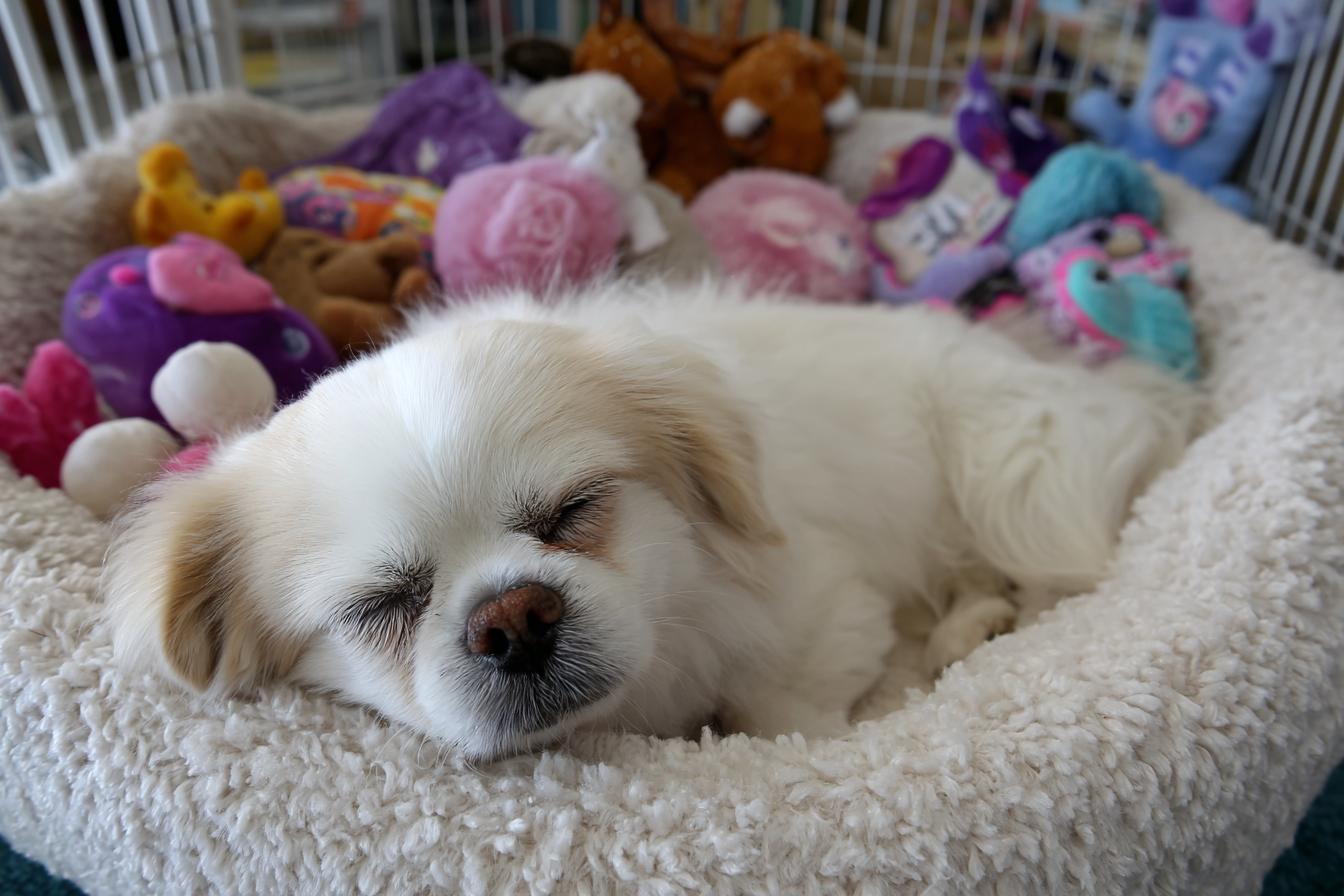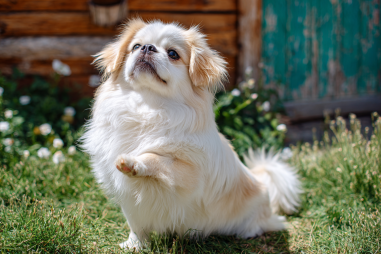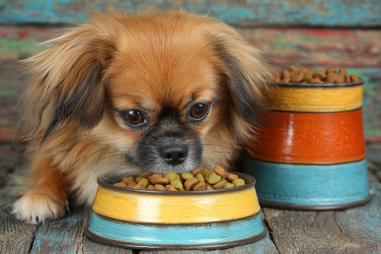Welcoming a Pekingese puppy into your home is a joyous occasion filled with excitement and anticipation. These charming little dogs are known for their regal appearance and affectionate personalities, making them wonderful companions. However, raising a healthy and happy Pekingese puppy requires careful attention and informed care. From preparing your living space to socialization and health maintenance, there are several important steps to ensure your puppy thrives. Let’s explore the essential care tips that will help you nurture a strong, well-adjusted Pekingese puppy.
Preparing Your Home for a Pekingese Puppy
Before bringing your Pekingese puppy home, it’s crucial to create a safe, comfortable environment tailored to their needs. Pekingese dogs are small but sturdy, and their curious nature means puppy-proofing your home is essential. Remove or secure any hazardous items such as electrical cords, small objects that can be swallowed, and toxic plants. Choose a quiet spot for your puppy’s bed or crate where they can retreat and feel secure.
Invest in the right supplies, including:
- A cozy bed or crate for resting
- Food and water bowls, preferably non-slip
- Puppy-safe toys that stimulate and entertain
- Grooming tools like a soft brush suitable for their thick coat
- Training pads or designated outdoor potty area
Ensuring your home is prepared ahead of time helps reduce stress for your new puppy and sets a foundation for successful care and training.
Feeding and Nutrition Guidelines
Proper nutrition is fundamental in raising a healthy Pekingese puppy. Their small size means they require nutrient-dense food formulated specifically for puppies. High-quality commercial puppy food tailored for small breeds is ideal because it provides balanced nutrients, supports growth, and caters to their energy requirements.
When feeding your Pekingese:
- Follow the recommended feeding guidelines on the packaging but adjust based on your puppy’s activity level and growth.
- Feed smaller, more frequent meals—typically three to four times a day—to avoid hypoglycemia, which small breeds can be prone to.
- Provide fresh water at all times to keep them hydrated.
- Avoid human foods that are toxic to dogs, such as chocolate, grapes, onions, and anything with xylitol.
- Consult your veterinarian to determine if supplements or special diets are necessary, especially to support joint and immune health.
Maintaining consistent feeding routines and monitoring their weight ensures your Pekingese puppy develops properly without becoming overweight or malnourished.
Vaccinations and Vet Visits
Keeping your Pekingese puppy healthy requires a schedule of regular veterinary care. Early vaccinations protect against common and potentially dangerous diseases such as parvovirus, distemper, and rabies. Your veterinarian will typically recommend a series of puppy shots starting around six to eight weeks of age, with boosters following at regular intervals.
Aside from vaccinations, routine vet visits allow you to:
- Track your puppy’s growth and development.
- Check for parasites and administer preventative treatments for fleas, ticks, and worms.
- Receive advice on nutrition, training, and behavior.
- Discuss spaying or neutering options when appropriate.
Establishing a relationship with your vet early on means you’ll have help addressing any concerns and maintaining your puppy’s health throughout their life.
Socialization and Training Basics
Socializing your Pekingese puppy is essential to raising a confident, well-behaved dog. Early exposure to different people, places, sounds, and other pets helps them adjust to varied environments and reduces fearfulness or aggression later in life. Begin socialization as soon as your puppy has completed their necessary vaccinations.
When training your Pekingese puppy, keep the following tips in mind:
- Use positive reinforcement techniques such as treats, praise, and playtime to encourage good behavior.
- Be patient and consistent—Pekingese can be independent, so gentle persistence works best.
- Start with basic commands like “sit,” “stay,” “come,” and house training.
- Introduce crate training to provide a safe space and aid in housetraining.
- Enroll in puppy obedience classes if possible to provide structured socialization and learning opportunities.
Proper training and socialization help prevent behavioral problems and build mutual respect between you and your puppy.
Safe Play and Exercise
Although Pekingese dogs have a sturdy build, their small size means exercise and playtime should be safe and controlled. These puppies enjoy moderate activity that stimulates both their minds and bodies, helping to prevent boredom and destructive behavior.
Consider these exercise tips:
- Short, gentle walks on a leash suitable for small breeds are ideal.
- Supervised play sessions in a secure, fenced area allow them to explore safely.
- Interactive toys and puzzle feeders help keep their minds sharp.
- Avoid high-impact or strenuous exercises that can stress their developing joints or respiratory system.
Regular, appropriate exercise keeps your Pekingese puppy healthy, maintains a good weight, and provides valuable bonding time.
Preventing Common Puppy Health Issues
Being aware of the health concerns common to Pekingese puppies allows you to take preventative measures early. These may include:
- Respiratory Issues: Due to their flat faces, Pekingese can experience brachycephalic airway syndrome, so avoid overheating and strenuous exercise, especially in hot weather.
- Eye Problems: Their prominent eyes are vulnerable to injury and infections, so keep them clean and monitor for redness or discharge.
- Dental Care: Small breeds are prone to dental plaque and tartar, making regular teeth brushing and dental check-ups important.
- Skin Folds: Clean and dry facial folds regularly to prevent infections and irritation.
Routine grooming and veterinary check-ups combined with knowledgeable at-home care will help you catch and address health issues before they escalate.
Building a Strong Bond
Developing a loving relationship with your Pekingese puppy is one of the most rewarding parts of raising them. Spend quality time cuddling, playing, and talking to your puppy. Their affectionate nature thrives on attention and companionship. Consistent routines and gentle handling build trust and reduce anxiety.
Remember to respect your puppy’s individual personality and allow them space to explore and rest. By responding to their needs with kindness and patience, you reinforce your role as a caring and reliable companion.
This bond establishes a lifelong partnership based on love, communication, and mutual respect.
The Joy of Raising Your Pekingese Puppy
Caring for a Pekingese puppy is a wonderful journey that requires thoughtful preparation, consistent care, and heartfelt affection. By setting up a safe home, providing proper nutrition, maintaining regular health check-ups, and offering socialization and exercise, you ensure your puppy grows into a healthy, happy adult dog. Paying attention to their unique needs and building a strong bond creates a fulfilling relationship that will brighten your life for years to come. With dedication and love, your little Pekingese friend will thrive and bring endless joy into your world.







